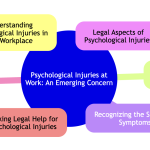Worker’s Comp: Mental Health in the Workplace
Mental health injuries at work qualify for workers' comp considerations. Recent studies have shed light on the major increase in psychological injuries in the workplace, including PTSD, anxiety, and depression, that has spread across the United States.
In fact, surveys show that psychological injuries have surpassed physical injuries in the workplace.
What could be causing this surge in mental health deterioration?
Researchers believe that the major causes could be high demands, toxic work environments, and harassment.
This article from Lancaster worker’s compensation attorney, RG Injury Law discusses these challenges: recognizing symptoms, understanding their causes, can the legal action to take to receive the benefits you are entitled to.
Key Takeaways
- Psychological injuries are now the leading workplace injuries.
- Stress and anxiety are the main psychological injuries impacting workers.
- High demands, toxic culture, and harassment contribute to mental health issues.
- PTSD and burnout are prevalent, particularly in high-demand jobs.
- Legal support can help employees claim workers' compensation.

Understanding Psychological Injuries in the Workplace
Definition of Psychological Injuries
Psychological injuries refer to mental health conditions triggered by workplace stressors.
These include:
- PTSD: Severe anxiety following traumatic events.
- Anxiety: Persistent worry and fear.
- Depression: Chronic sadness and loss of interest.
- Burnout: Exhaustion due to prolonged workplace stress.
Statistics and Trends
Recent studies reveal a surge in psychological injuries in the workplace:
- 52% of workplace injuries are psychological injuries.
- 87% of employees report a toxic work culture.
- Workplace mental health issues have soared by 63%. (1)
Causes of Psychological Injuries at Work
Toxic Work Environment
Toxic workplaces often feature micromanagement, lack of recognition, or unrealistic demands.
This environment creates chronic stress and burnout.
Employees in such settings struggle with anxiety and depression, ultimately impacting their well-being and productivity.
Workplace Harassment and Bullying
Harassment, discrimination, and bullying foster a hostile atmosphere.
The relentless pressure, belittling, and exclusion can lead to severe psychological injuries, causing victims to feel anxious, depressed, and fearful of returning to work.
Work-Related Stress and Burnout
Long hours, high job demands, and lack of control are major contributors to stress and burnout.
1. Stress
- Stress arises from excessive workloads, tight deadlines, and job insecurity.
- It leads to physical and mental exhaustion, impacting productivity and morale.
2. Burnout
- Burnout manifests as emotional exhaustion, depersonalization, and reduced personal accomplishment.
- Over time, it can lead to severe anxiety, depression, and even PTSD.
RG Injury Law wins a settlement for client in Workers Comp Case | Lancaster, PA
Recognizing the Signs and Symptoms
Common Indicators
Psychological injuries exhibit various symptoms that can disrupt daily functioning. Watch out for:
- Insomnia
- Anxiety
- Depression
- Fatigue
- Irritability
Severity Spectrum
The severity of psychological injuries ranges from mild to debilitating.
1. Mild:
- Occasional sadness or worry
- Minor sleep disturbances
2. Moderate:
- Persistent anxiety or depression
- Difficulty concentrating
- Frequent fatigue
3. Severe:
- Panic attacks
- Suicidal thoughts
- Complete inability to work
Legal Aspects of Psychological Injuries
Workers’ Compensation Coverage
Workers' compensation covers psychological injuries if they are directly related to employment.
However, coverage varies across states.
These states DO NOT offer workers' compensation benefits for PTSD and other "mental-only" injuries:
- Alabama
- Arkansas
- Georgia
- Mississippi
- North Dakota
- South Carolina
- South Dakota
- West Virginia
- Wyoming
States That DO Offer Workers' Compensation Benefits for PTSD and Other Psychological Injuries
Fully Covered States:
- California
- Colorado
- Connecticut
- Idaho
- Louisiana
- Nevada
- New Hampshire
- New Mexico
- Oregon
States That Offer Benefits Under Certain Circumstances:
- Arizona
- Florida
- Illinois
- Kentucky
- Maine
- Massachusetts
- Minnesota
- Missouri
- Montana
- New York
- Rhode Island
- Texas
- Vermont
- Washington
Claim Requirements
Making a workers’ compensation claim involves several essential steps.
Make sure you follow all requirements. You are entitled to these benefits, don’t make it more challenging for yourself.
To claim workers' compensation for psychological injuries:
- Obtain medical documentation of your diagnosis.
- Prove work-relatedness by showing the injury occurred due to workplace stressors.
- Witness Testimonials may be optional.
Creating a Safe Workplace
Creating a Safe Workplace
Fostering a healthy workplace environment can reduce psychological injuries.
- Open Communication: Encourage employees to share concerns without fear of retaliation.
- Reduce Stigma: Promote mental health awareness and normalize seeking help.
- Offer Flexibility: Allow flexible hours or remote work for better work-life balance.
Employee Assistance Programs
Employee Assistance Programs (EAPs) offer support for mental health issues.
- Confidential Counseling: Private sessions to discuss personal or work-related concerns.
- Work-Life Balance Resources: Advice on stress management and healthy routines.
- Crisis Intervention: Immediate help in emergencies.
Seeking Legal Help for Psychological Injuries
Role of Legal Support
Legal advice is extremely helpful in understanding your rights and building a strong workers' compensation case.
An experienced attorney can guide you through the claims process, ensuring that all legal requirements are met. They will gather comprehensive evidence, including medical records and witness testimonies, to substantiate your case and establish the connection between your psychological injury and work-related stressors.
Skilled legal representation will also help you negotiate a fair settlement that covers lost wages, medical expenses, and rehabilitation costs. If needed, they will provide aggressive representation in court.
How RG Injury Law Can Help
RG Injury Law specializes in psychological injury cases and offers a client-centric approach to legal support. Their services include:
- Free Consultations: They will assess your case and provide personalized advice on how to proceed.
- Aggressive Representation: They will fight for fair compensation and protect your rights throughout the claims process.
- Workers' Compensation Expertise: They have extensive experience navigating Pennsylvania workers' compensation law, helping you build a strong case.
- Client Support: RG Injury Law ensures clear communication and guidance every step of the way, giving you peace of mind while handling your case.
Final Thoughts - Worker’s Comp for Mental Health in Lancaster PA
Psychological injuries are a serious issue in the workplace, with stress and anxiety leading the way. Toxic work environments and high demands contribute significantly. Early recognition of symptoms and seeking legal advice can help affected employees find justice.
If you or a loved one have suffered psychological injuries at work, RG Injury Law is a trusted resource for personal injury and workers' compensation cases in Lancaster, PA. Reach out today for a free consultation.
Reference:
(1) Forbes, Mental Health Issues Soar To Number 1 Workplace Injury, https://www.forbes.com/sites/bryanrobinson/2023/10/09/mental-health-issues-soar-to-number-1-workplace-injury/?sh=40fa02776c4c




